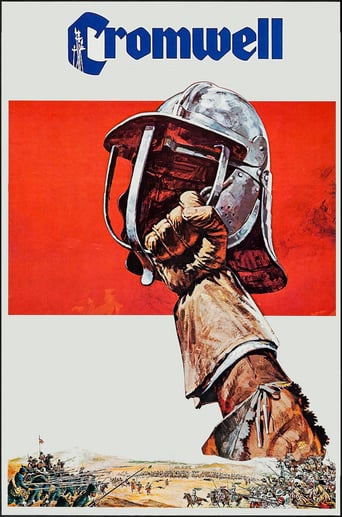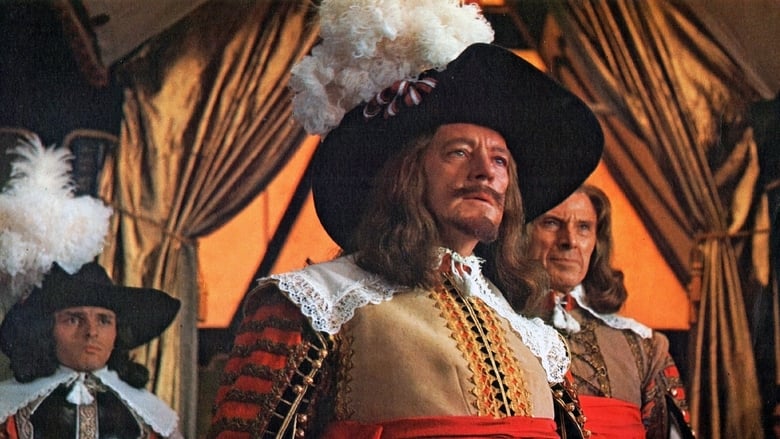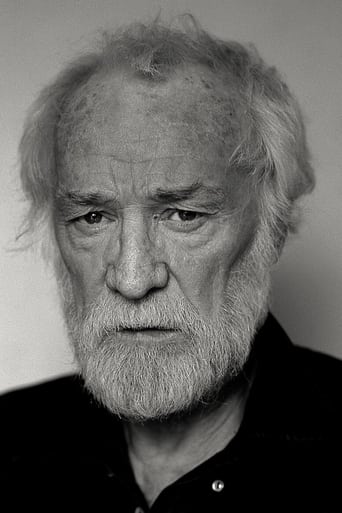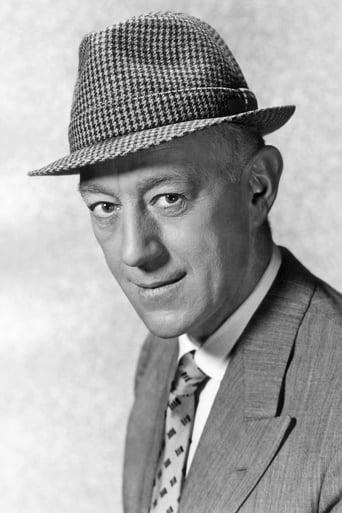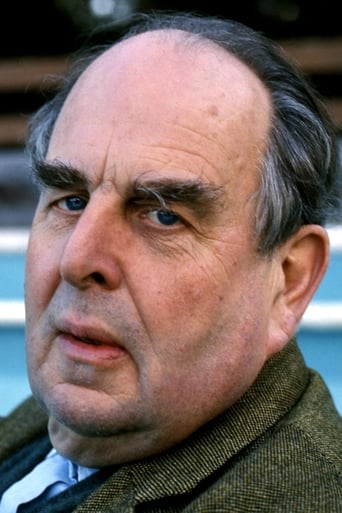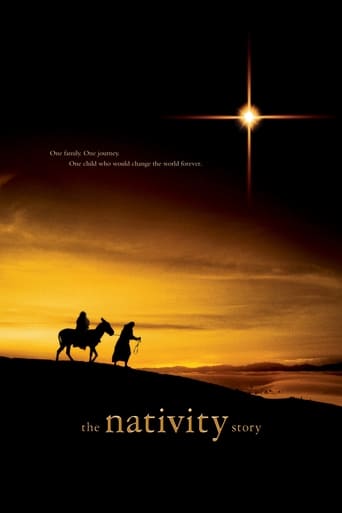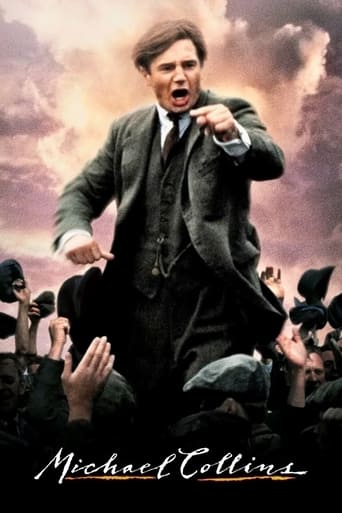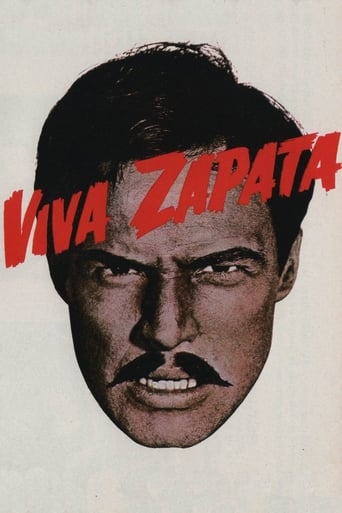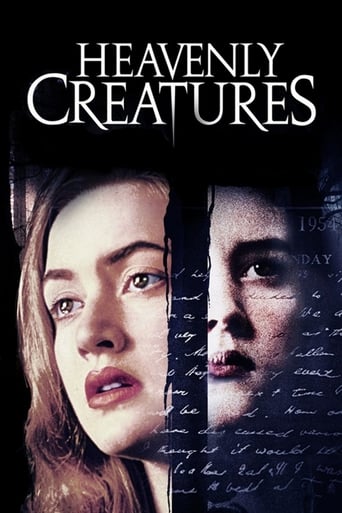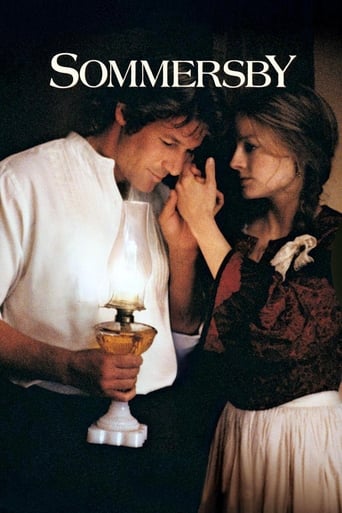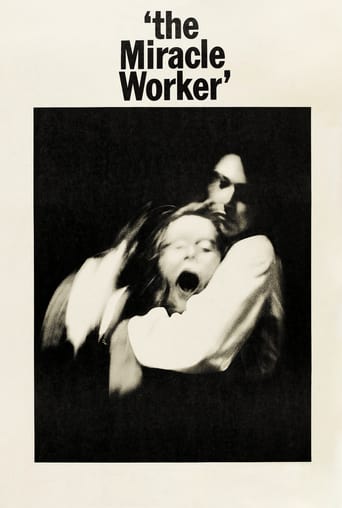Cromwell (1970)
Disgusted with the policies of King Charles I, Oliver Cromwell plans to take his family to the New World. But on the eve of their departure, Cromwell is drawn into the tangled web of religion and politics that will result in the English Civil War.
Watch Trailer
Cast
Similar titles
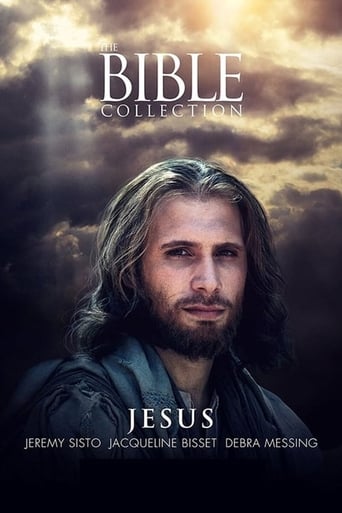
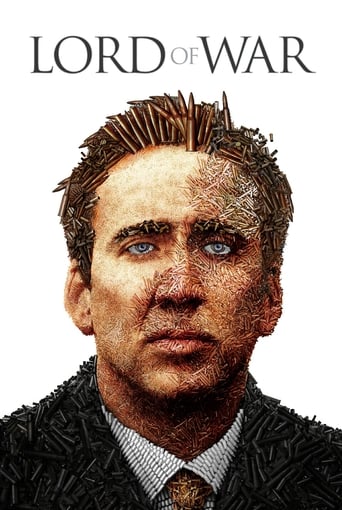
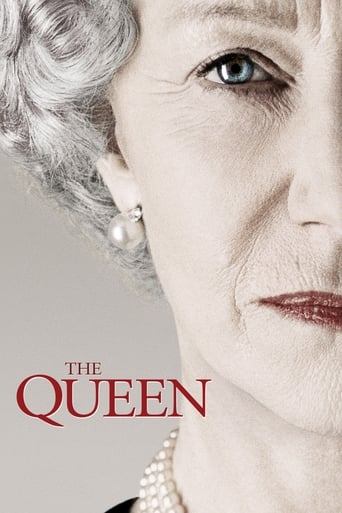

Reviews
Very very predictable, including the post credit scene !!!
Strong acting helps the film overcome an uncertain premise and create characters that hold our attention absolutely.
It's a feast for the eyes. But what really makes this dramedy work is the acting.
what a terribly boring film. I'm sorry but this is absolutely not deserving of best picture and will be forgotten quickly. Entertaining and engaging cinema? No. Nothing performances with flat faces and mistaking silence for subtlety.
A wonderful film which ranks with El Cid as one of the best historical blockbusters ever made. I've mentioned before that imaginative "B" directors often turn out staid and uninspired "A" work. This hasn't happened here. True, some critics feel that the non-battle scenes lack power, but I found them far more interesting and forceful. The inner action of men's minds, the crackle, dart and thrust of their speech, their motives, aspirations, stubborn beliefs and hidden agenda formed for me a richer panorama, a far more fascinating vista than the mere brute clash of iron against steel.The acting is well-night perfect with both Guinness and Harris superbly cast as contrasting king and conqueror. It is these two powerful players, both giving the performances of their lives, who rightly dominate the action. The director's script — following history itself — brilliantly thrusts them center stage and cleverly keeps them there until the inexorable end. It's hard to keep audience interest alive when the outcome of the plot is so well-known, but Hughes manages to work up such sympathy and suspense, we concentrate all our attention on events as they unfold so fascinatingly before our eyes. The sets, the costumes, the rich details and panoply of court and parliamentary life are alone so gripping — and beautiful to behold — that occasionally historical events seem like an intrusion! And that is exactly the right approach for a writer- director to take, crowding our hearts with such an abundance of inspiring and abhorrent images and ideas, there is no time to reflect. In Hughes' hands history is always vigorously alive, never static or blandly familiar, — let alone moribund or dull.
I do like a good historical drama and this 1970 epic certainly fits the bill. Of course there were a lot of them around at this time what with "Waterloo", "Nicholas And Alexandra", "A Man For All Seasons" and others. Like so many films of this type, the action centres on two main characters played by lead actors of some weight and that's certainly the case here with Richard Harris essaying the title role and Sir Alec Guinness as his royal nemesis Charles I.At first I thought Harris would be too physical an actor for his part, but once you get used to his endless prowling, staring shouting, he gives a strong performance, although he certainly doesn't fit my mental image of Cromwell's appearance, despite the inclusion of the famous warts on his physiognomy. Guinness is quite superb as the haughty monarch whose pride precipitates the fall of his head, displaying the King's over-reliance on other's opinions, especially his Catholic wife's, his puzzlement when things go wrong and lastly his regal loftiness when put on trial by what he would no doubt term his inferiors.I understand that some liberties were taking with the depiction of real life personages and events of the time, which is I think a shame as the director has obviously sought a realistic approach in every other aspect. The battle scenes are well-drilled although occasionally you can see lesser numbers at war than there should be and I also felt I could see where cuts were made to make the film less than a marathon watch, particularly Charles' capture and his trial.The sets and costumes are fine although I found the supporting cast somewhat varied in quality. Overall though this was an interesting study in the battle between royal privilege and the free-will of the people. The latter won and Cromwell duly assumed the title of Lord Protector (a king in all but name), but his elevation was short-lived and England duly returned to the Monarch with the return of Charles' second son Charles II only five years later.
It is strange indeed that there is such a variety of interpretations of the film, quibbles about historical accuracy etc. when the closing narration both makes crystal clear what the film's purpose is and makes claims far more controversial than the film's strongest detractors have noticed. The narration celebrates the change from absolute to a constitutional Monarchy and Cromwell for bringing it about. It says that the 5 years of Cromwell's "reign" brought about an England "feared, respected and powerful". It takes obvious pride in him not just on England's behalf but much more widely as having established the principal of the primacy of parliament over the monarchy. Surprising that reviews quibbling over points of historical accuracy don't mention this narration with its central claim and entirely uncritical celebration of Cromwell.Since 1899 a statue of Cromwell has had a prominent location in the gardens of the British Houses of Parliament, something not without controversy from then until now. The statue's continuing presence can be read as Parliament's loud - and proud - assertion of its primacy.The script and the choice of one of the UK's finest actors, Alec Guinness, gave a gracious and nuanced portrayal of Charles 1. The choice of Richard Harris added to a blunt, forceful and determined Cromwell. The portrayal of a Parliament left to make up its own rules - and Cromwell's dramatic return with the Army to impose his view is memorableIt is a fine and interesting film, also a history lesson but one not everyone would celebrate. It is about politics, not pageantry
This film is well-done and the battles, military or political, are clear enough in spite of the numerous ellipses due to the extremely dense and long period covered by the film from 1640 to 1650 or so. Yet it does not really explain who Cromwell was and if he had real objectives of his own beyond his religious rhetoric. It also clearly explains why this period could not go beyond that transitory and imperfect compromise of the least bad in a difficult period leaving the better and the best for later.The film depicts a king who was absolutely tied up in his feudal belief that he had been appointed by God and had no accounts to give to any one. This dominant feudal position was also the dominant legal position: there was no law and no jurisprudence that enabled a king to be dismissed by any authority other than death and God. On that question Cromwell represented a new point of view that had never existed anywhere else in the Christian world at the time. What does human society have to do in such a situation? Move on and let history do what it wants. So they moved on and had the king beheaded after a three days' hearing that could hardly qualify as a trial.Could there have been a compromise moving towards any parliamentary democracy? No, for three main reasons. First the king was stubborn and probably not very swift, at least not able to understand that God is a very good fellow but that on earth we work with compromises and not absolute authority. Second parliament, or what was left of this long parliament, was not elected by the people as is repeated galore of times in the film, but only by a few tens of thousands of people: the propertied and business owning tax paying people and these people, landowners first, could have in their chattel some human serfs or indentured servants who were nothing but a property of some type. These of course, the vast majority of the people had no right to vote. Third Cromwell never accepted to move towards a wider and more open definition of democracy like the Levelers were asking and he even had one of their leaders hanged. In other words the two civil wars led to a draw and nothing else and the only way out was to disband parliament and to rule alone.But the film – that is maybe too old for that – could have questioned history a little bit more and insisted on the essential and contradictory elements of the period. First it is Parliament that introduced for the first and only time in England a body of state censors to implement official censorship of anything published before publication. The discourse about religious freedom was in fact a very one-sided approach of that freedom: freedom provided the Catholics be chased and hunted, the Anglican church and all chapels have no bishops and archbishops, (which was nearly impossible to implement with the Anglican church, and yet they tried). It would have been interesting to show that tremendously sectarianism if not fundamentalism on the side of the moderate puritans like Cromwell as well as on the side of the most committed people beyond this revolution.But the film is absolutely silent on the main subject: the economy. The great expansion to the Americas (northern essentially) but also to the Indian Ocean and to Africa, started under Elizabeth, went on under James I and Charles I, but also went on and even accelerated under Cromwell. But this great expansion was not paid by the Crown for the simple reason the Crown had no fleet whatsoever. The fleet was a merchant fleet in the hands of the mercantile societies and companies that started being set up, and the sailors were those of these companies ,including the militarized ones necessary for the security of that commerce. The Royal fleet was still to come and will be for some time still. If they had thought of that they would have understood the importance of this period in England: it liberated the energy of these merchants because many controls and obligations set under the kings were dropped or eased out.That would also explain why Cromwell had to summon Parliament when he wanted to fight his naval war against Spain (essential for the development of maritime commerce), he had to go to Parliament to ask the Members of Parliament who directly represented or were the merchants in question to accept to lend their ships and their sailors to organize some fleet. That's what happened under Cromwell again.That would also explain what we can think of the readiness of history to accept change. England was not ready for a true parliamentary system of the people for the people by the people. Free and general elections were not even thought of possible. The Industrial Revolution was not even in the making yet. And habeas corpus and other fundamental human rights were not yet even imagined. That will need the Restoration which will be a failure with the second king, James II, and the Glorious Revolution that will oust him. Cromwell at least had the great merit of not trying to force history, or at least not too much, and what he did more or less survived his time after the restoration. The beheading of the king was useless, probably a mistake as Tony Benn thought, but he refused to become a King in his place. He stopped short of the irreversible mistake that would have brought him down in less than a year probably. In other words he was on that point as prudent as Napoleon who did not take the title of King after the French Revolution.So I am slightly disappointed by this film because it is at best a prudent presentation.Dr Jacques COULARDEAU
